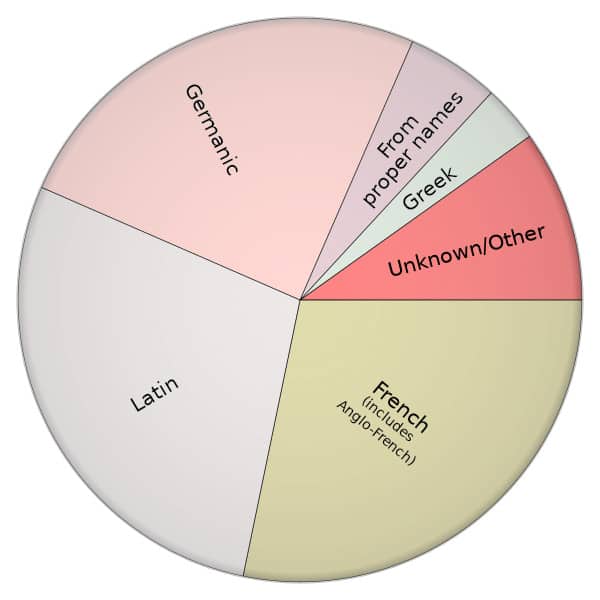As a learner of English, you’ve no doubt noticed that the English language is strange. English spelling is one of the most difficult sticking points for many English learners. This is due to the amount of borrowed words that exist in English.
Many different languages have contributed words to English. Upwards of 80% of all English words have been borrowed from another language. When English borrows new words they usually do not change their spelling. This leads to a large number of words which sound different from the way they are pronounced.
But, how many words in English are native English words which were never borrowed from another language? Less than 25% of all English words are native English. This means that over 75% of English vocabulary has been borrowed from other languages. English has a long history full of contact with many other tongues. Latin & Greek give us 39% of English words, French gives 29%, and 7% comes from elsewhere.
A Brief History of English.
English has had a long history. In order to understand why the majority of English words are borrowed, we need to know a bit about English history. The first evidence of the English language is found around the year 600AD. (That’s over 1400 years of history!)
This period of English was known as Old English. At this time, English was a very different language than it is today. Even native English speakers cannot understand this old form of English. It looks more similar to German than it does modern English!
English is known as a Germanic language. This means it shares a common ancestor with languages such as: German, Swedish, Norwegian, Danish, Dutch, and others. The Old English period was a time when English was the closest to this ancestor language, so it looked and sounded very different from how it does today.
This is what I mean when I call certain words “native” English words. The words of this period came directly from that earlier ancestor language. They were not borrowed into English at a later date. They always existed within English.
So what did English look like during this time period? Let’s take a look at a section of the bible written in Old English:
Faeder ure þu þe eart on heofonum Sie þin nama gehalgod to becume þin rice.
Matthew vi.9-13 “Old English Phonemes.” A Linguistic History of English, by Robert A. Peters, Western State Washington College, 1968, pp. 84–84.
geweorðe þin willa on eorðan swa swa on heofonum.
urne gedaeghwamlican hlaf sele us to daeg.
and forgief us ure gyltas swa swa we forgiefað urum gyltendum
and ne gelaed þu us on costnunge ac alies us of yfele.
You might be able to understand a few words from the text above, but most of it will be incomprehensible. You can see just how much English has changed since then. There are even some letters we don’t use anymore! If you’re interested in learning more about the letter þ, check out this article I wrote about it.
Here is the same passage written in modern English:
Our father, which art in heaven, hallowed be thy name.
Matthew vi.9-13 “Early Modern English Phonemes.” A Linguistic History of English, by Robert A. Peters, Western State Washington College, 1968, pp. 104–104.
Thy kingdom come. Thy will be done, in earth as it is in heaven.
Give us this day our daily bread.
And forgive us our sins, as we forgive our sinners.
And lead us not into temptation, but deliver us from evil.
If you’re interested in hearing what Old English may have sounded like, check out this video where a woman reads some Old English verses.
During this time, the Anglo-Saxons (the first speakers of English) were self-governing. This changed however in 1066 after the battle of Hastings.
The Middle English Period.
In 1066 the battle of Hastings was fought. It resulted in the conquest of the Anglo-Saxons by the Normans who came from Normandy in Northern France.
After this event, the Anglo-Saxons were ruled over by the Normans. The language they spoke, Norman French, became the language used in the king’s court and among the nobility of society. This relegated English to a less prominent position in society.
It also began a long period of borrowing. During this time, many new words were borrowed into English from Norman French. We get words such as beef, poultry, justice, and warrior.
Near the end of the Middle English period around 1400AD, English began to become a prestigious language in Britain once again. Eventually it supplanted Norman French and began to be used in the king’s court and literature began to be written in English once again.
This lead to a situation where the vocabulary of English was lacking to describe more abstract ideas. So many new words were borrowed into English through Latin, French, and Greek to fill this gap.
This continued throughout the ages until the modern times. Now the majority of English words have been borrowed from other languages and a minority of surviving English words are of a native origin.
Where Do Most English Words Come From?
So if most of the words in English are borrowed from other languages, where do they come from?

The chart above shows all of the sources for words in modern English.
- 29% have a Latin origin
- i.e. animal, virtue, join
- 29% have a French origin
- i.e. poor, castle, cherry
- 25% have a Germanic origin
- son, earth, father
- 6% have a Greek origin
- oligarch, telescope, bacterium
- 7% have an unknown origin or come from other languages
- satin, moose, ketchup
- and 4% come from proper names
- Rhodesia, jack, gerrymander
You can see that the majority of English words come from other sources. 35% of all words in English come from either Latin or Ancient Greek. Most often these are names for scientific items or technical terms used in special circumstances.
However, some of them are normal every day items and ideas such as animal which comes to us from Latin.
The second largest category of words borrowed into English comes from French. This isn’t a surprise because of the close relationship that English had with Norman French for hundreds of years after the battle of Hastings in 1066.
This is an even greater amount of words than the 25% which have a Germanic origin. Keep in mind that this isn’t only native English words. These are also words that were borrowed into English from other Germanic languages such as German or Swedish, or other older Germanic languages such as Old Norse or Gothic.
This means that the number of words in English which are native English is even smaller than 25%!
Which Words Are Native English Words?
The words which can be considered native English words are mostly words which describe our most basic and fundamental relationships, tools, or items.
These words describe the state of English speakers as they existed over 1000 years ago. So these words reveal to us the way these people lived.
Below is a list of words which have an Anglo-Saxon origin:
| Native English Words |
|---|
| axe |
| apple |
| alive |
| bird |
| blood |
| brother |
| child |
| cold |
| clean |
| deer |
| daughter |
| drink |
| evil |
| eye |
| elbow |
| fish |
| friend |
| fox |
| game |
| gold |
| god |
| hand |
| honey |
| husband |
| ice |
| I |
| island |
| king |
| kind |
| kiss |
| love |
| laugh |
| ladle |
| man |
| milk |
| moon |
| name |
| night |
| nut |
| owl |
| woman |
| young |
| rat |
This is a short list of the types of words which are native to English. It isn’t a complete list, however. You can see from the list of words above that hardly any of them describe complex or abstract ideas.
Most of the words represented above describe relationships, animals, simple tools, or basic emotions.
These are the types of words which have stuck with English since its beginning. The words which are near to our hearts and describe our most basic primal ideas, feelings, and desires.
Some Surprising Facts.
Even though many of the most basic English words are native to English, not all of them are. There are some surprising facts that you may not have known about some English vocabulary. Let’s talk about them now.
She
The third person feminine pronoun, she, is actually a word that was borrowed into English from Old Scandinavian.
Before this change happened, some time in the Middle English period, the Old English pronoun to describe a woman was heo(she), hie(her), hiere(her).
The Old Scandinavian pronoun sja was adopted into English and eventually became the pronoun we use today, she.
Deer
During the Old English period, the word used to describe all animals was deor. This is the ancestor to the modern English word deer.
At this time, this was the word that was used to describe all living non-human beings. It wasn’t only used to describe the medium sized antlered animal that we use it for today.
At some point in the past, we stopped using deor to talk about all animals and we adopted the Latin word animal instead. Now the meaning of deor has narrowed to become the name of one animal only and we now use animal to describe this category of beings.
Most Words are Borrowed, but…
As we’ve just discovered, the majority of all words in English are borrowed from other languages. However, there is a surprising fact about the way we use words in English despite so many of them coming from other languages.
In her book, A History of English: A sociolinguistic approach, Barbara Fennell states that, in fact, 70% of all words used in any given text have an Anglo-Saxon origin.
This means that even though most of the words in English are borrowed from other languages; English speakers tend to stick to native English words while writing. This is likely true for speaking as well.
English speakers have a wide vocabulary to choose from when speaking or writing, but the preference seems to be using native English words!
Conclusion
Even though the majority of English words have come to us through other languages. English still retains a strong core of native words which we use to describe the world in the most basic and fundamental ways.
The words we use to talk about our close relationships, to describe our feelings and desires, and to talk about simple tools are all derived from English’s most recent ancestor language.
Despite the large amount of foreign words brought into English over the centuries, English speakers still tend to stick towards using words which are derived from this core set of words which have stood the test or time for a millennia.
If you enjoyed this article, you’ll love my other articles in the Hidden History of English series. They all look at incredible history hidden within the English language! Check them out here.



